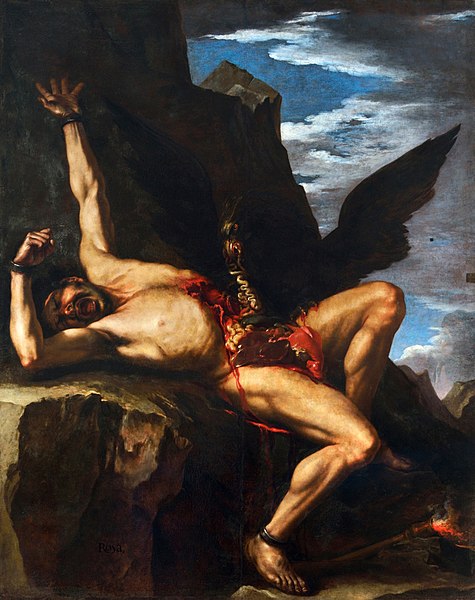Virginia Postrel tries to correct the common misinterpretation of the story of the Titan Prometheus:

“The Torture of Prometheus” by Salvator Rosa (1615-1673)
Oil painting in the Galleria Nazionale d’Arte Antica di Palazzo Corsini via Wikimedia Commons.
Listening to Marc Andreessen discuss his Techno-Optimist Manifesto on the Foundation for American Innovation’s Dynamist podcast, I was struck by his repetition of something that is in the manifesto and is completely wrong. “The myth of Prometheus – in various updated forms like Frankenstein, Oppenheimer, and Terminator – haunts our nightmares,” he writes.1 On the podcast, he elaborated by saying that, although fire has many benefits, the Prometheus myth focuses on its use as a weapon. He said something similar in a June post called “Why AI Will Save the World“:
The fear that technology of our own creation will rise up and destroy us is deeply coded into our culture. The Greeks expressed this fear in the Prometheus Myth – Prometheus brought the destructive power of fire, and more generally technology (“techne”), to man, for which Prometheus was condemned to perpetual torture by the gods.
No. No. No. No.
Prometheus is punished for loving humankind. He stole fire to thwart Zeus’ plans to eliminate humanity and create a new subordinate species. He is a benefactor who sacrifices himself for our good. His punishment is an indicator not of the dangers of fire but of the tyranny of Zeus.
Prometheus is cunning and wise. His name means foresight. He knows what he is doing and what the likely consequences will be.
Eventually his tortures end when he is rescued by the hero Herakles (aka Hercules), who shoots the eagle charged with eating Prometheus’ liver every day, only for it to grow back to be eaten again.
The Greeks honored Prometheus. They celebrated technē. They appreciated the gifts of civilization.
The ancient myth of Prometheus is not a cautionary tale. It is a reminder that technē raises human beings above brutes. It is a myth founded in gratitude.
1. Frankenstein isn’t The Terminator either. Frankenstein is a creator who won’t take responsibility for his creation, a father who rejects and abandons his child. The Creature is frightening and dangerous but he is also the book’s moral center, a tragic, sympathetic character who is feared and rejected by human beings because of his appearance. Only then does he turn deadly. Frankenstein arouses pity and terror because we empathize with its central figure and understand his rage.
The novel’s most reasonable political reading is not as a story of the dangers of science but as a parable of slavery and rebellion. “By the eighteen-fifties, Frankenstein’s monster regularly appeared in American political cartoons as a nearly naked black man, signifying slavery itself, seeking his vengeance upon the nation that created him,” writes historian Jill LePore, who calls the “Frankenstein-is-Oppenheimer model … a weak reading of the novel.” I agree.
The Romantics tended to identify with Prometheus and Mary Shelley’s husband, Percy Bysshe Shelley, wrote a play called Prometheus Unbound, further undermining the reading of Frankenstein as an anti-Promethean fable.



